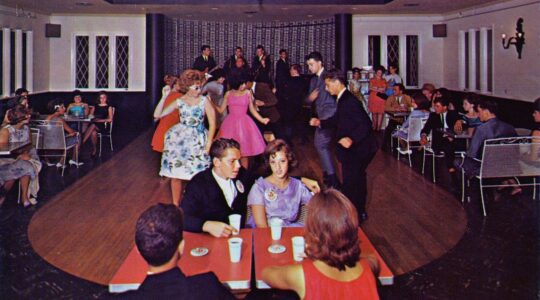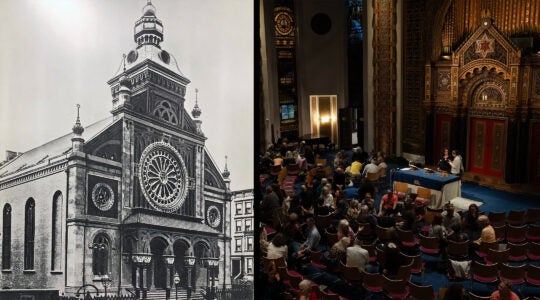From the inside, the Kneses Israel synagogue in Sea Gate looks like Cossacks raided and burned it.
Chunks of charred wood are strewn around the sanctuary, is concentrated, almost deliberately, in front of the ark, as if the intent were to set the Torah scrolls themselves aflame under the stripped and skeletal roof.
Thankfully, no one was hurt in the early hours of April 13, 2017, when the fire broke out without a determined cause. Left without a home, the Kneses congregation would move into the synagogue’s adjacent annex, and start to rebuild.
But in the two years since then, the 98-year-old synagogue remains charred and empty as a legal battle burns in its stead, pitting the Kneses Israel congregation against its own past president and the Satmar chasidic sect.
Kneses members say Satmar is staging a hostile synagogue takeover. Kneses’ past president, Wayne Butler, alleges in his lawsuit that the Kneses rabbi, a Chabad emissary (though the synagogue is nondenominational), is maneuvering for Chabad to take over the shul.
The fight in this remote corner of Brooklyn, once a seaside getaway for wealthy Manhattanites, is personal, and dirty tactics have been used. Congregants say they’ve been illegally kept out of the annex building by Satmar for most of the past year through a combination of locked doors and hired guards, confirmed by Sea Gate police reports in court records. Sometimes, the faithful have prayed outside the annex.
“Someone told me it was the Jews who locked the shul, and didn’t want to let us in,” reads a letter, in court records, from Rutti Rosen, a Holo-caust survivor from the former Soviet Union. Rosen had come to the annex on Saturday morning, March 23, 2019, to pray and celebrate her 85th birthday.
“I would’ve expected this behavior from the Soviets, or the Nazis, but never from my fellow Jews,” she said, “and not just any Jews, but religious Jews.”
The congregation only tentatively regained access to the annex over the past three months.
“As of now, we have an opportunity to have more or less what we want to have, our shul and our place,” said Natalya Permyakova, a Kneses board member. “Compared to my children [praying on Shabbat] outside when it was still cold, during winter, because they couldn’t enter our shul, right now it’s much better.
“But again, the danger is still there,” Permyakova said. Kneses Israel can only use the annex building on weekends, and litigation is ongoing.
“We are trying to not only keep the synagogue running, but we want to keep it growing,” said Rabbi Chaim Brikman, the Chabad emissary who runs Chabad by the Ocean in Sea Gate, and has served Kneses Israel for over 28 years. Though there are seven chasidic synagogues in Sea Gate, Kneses is the only shul to reach out to non-observant Jews, many of whom are immigrants from the former Soviet Union.
“What do we tell the community?” Rabbi Brikman said. “‘No, we can’t do it, because they’re suing us and we can’t go in?’”
Underlying the lawsuit is a story of stubborn tenants, synagogue politics and Wayne Butler’s change in loyalty, which continues to baffle mem-bers of Kneses Israel.
When asked about the case, Butler deferred to his attorney, Israel Goldberg, who declined to comment for this story.
♦
At the time of the Kneses Israel fire, the Satmar-affiliated United Tal-mudicl Academy of Boro Park (UTA) was renting the annex on a month-to-month basis, as they had since 2010. When Kneses asked UTA to leave, they did, voluntarily, in June of 2017.
Then they sued. In August 2017 UTA claimed to have been illegally locked out of the annex, and asked to be let back in. Kneses members were enraged. They had just spent thousands of dollars to fix up the annex for regular synagogue use.
“If UTA returns, we will be homeless!” said a petition against the yeshiva signed by then-interim Kneses President Wayne Butler. “Our commu-nity will lose their house of worship and a place for community events. We will suffer terribly!”
Kneses and UTA reached a settlement on Jan. 3, 2018. UTA was allowed to operate in the annex for the rest of the school year, and exempted from paying Kneses rent. In exchange, on July 1, 2018, UTA would leave for good.
They didn’t.
On July 10, 2018, Israel Goldberg, a longtime Satmar lawyer retained by Butler, filed a Stipulation of Discontinuance in New York City Civil Court, canceling the Kneses-UTA settlement. Butler gave UTA a new one-year lease for the annex, and waived all rent for the 2018-19 school year owed to Kneses.
There was just one problem: By July, Butler was no longer president of Kneses Israel, or authorized to make any decisions for the synagogue.
“[Butler] did something unimaginable, actually,” said Joseph Wolhendler, a member of the Kneses board. “He knows that by bringing in another tenant, the synagogue has nowhere to go.”
♦
By all accounts, Wayne Butler was a beloved member of Kneses Israel.
“If you look at his support over the years for community needs, he and his family was the one who provided ice cream for Shavuos celebration, toys for Simchas Toras,” said Permyakova. “That was beautiful.”
After the synagogue fire, Butler stepped in as interim president to guide the congregation. But relationships began to sour over a proposed Kneses Israel merger with Chabad by the Ocean.
Though Rabbi Brikman, head of Chabad by the Ocean, had been Kneses’ rabbi since the early 1990s and had helped Butler become more Jewishly observant, Butler dragged his feet on the merger.
“Officially he was saying that he needs more time,” Permyakova said. “He never came up with any answers. … His tactics at that time were just to delay, to make everything possible for this vote not to take place.”
In January of 2018, a strong majority of Kneses members voted for the merger.
Then, in April of 2018, Fern Ryback, then-treasurer of the board, was found to have written over $110,000 in Kneses checks to an electric company for unclear synagogue repairs. The high price tag was never explained to the board, and Ryback was barred from approving any other payments on behalf of Kneses.
Ryback is Butler’s sister, and paranoia set in about Ryback being sued for fraud, according to Kneses board members.
When reached, Ryback deferred to Butler’s lawyer, Israel Goldberg, who declined to comment.
“There was something there that they were worried about,” said Wolhendler. “Because they kept on saying, ‘Oh, are you accusing me?’ I wasn’t accusing anybody.”
Wolhendler still doesn’t know why Ryback issued the checks. Rabbi Brikman said that Butler accused him of wanting to sue Ryback, which the rabbi denies.
But the damage was done. Board members speculate Butler tried to pro-tect his sister from being sued for fraud by aggressively distracting the Kneses board. Butler went so far as to serve a restraining order to cancel board elections, scheduled for June 13, 2018. Then he rescinded the order.
The day of elections, Butler sent an email to board members: “Please be advised that if by some small chance I am not nominated and re-elected to serve on the future board of Kneses Israel by the current membership I will accept their decision.”
Butler was not nominated to run or elected. And in a lawsuit filed in August of 2018 against Kneses’ new board and Rabbi Brikman, he claimed the elections had been illegal under the Kneses Israel bylaws; that he was still rightfully president of Kneses; and that Rabbi Brikman was trying to take over the synagogue. Butler was referring to bylaws that had been missing (and thus weren’t being followed) for decades. They were found in 2017.
Butler’s unauthorized July lease to the UTA Satmar yeshiva, and his law-suit (while represented by a Satmar-affiliated attorney), meant the Kneses Israel congregation was unable to move into the annex or complete the Kneses-Chabad merger.
“I would never imagine [Butler] to go against the will of the majority,” Permyakova said. “It’s like, you put your own opinion above the needs of the community … against the needs of the same children he had been feeding.”
♦
A year of litigation, two hearings and over 360 case exhibits later, Butler’s lawsuit has come to no conclusion, and the Kneses congregation continues to be in limbo. The lease Butler singlehandedly gave UTA, the Satmar yeshiva that occupies the Kneses annex, expired on July 8.
According to Yisroel Schulman, the lawyer representing Kneses’ board and Rabbi Brikman, UTA hasn’t moved out of the annex.
“Not only have they not moved out, they’re illegally doing construction there without a permit,” Schulman said, “without approval of the court, and in a space they’re not supposed to be occupying right now.”
No one knows if Butler will give UTA another lease.
Butler’s hopes have turned to a settlement between the two parties to be mediated by someone with family ties to Kneses Israel going back three generations. Schulman says he knows nothing about the private attempts to mediate.
“Nobody has contacted us about engaging in formal mediation,” he said. “The judge tried a few times to mediate. She met with the lawyers for hours … trying to negotiate a settlement.”
“The other side insists that Satmar continues to remain [in the annex] as part of any settlement with us, which is inappropriate,” Schulman said.
Kneses Israel board members and Rabbi Brikman say they want UTA to leave the annex so they can permanently move in, and for Butler’s case to be dismissed — or for the judge to rule in their favor.
Kneses Israel’s unique position, as the only synagogue in Sea Gate to serve non-observant Jews, keeps the congregation fighting. “We are their only spiritual and religious lifeline,” Rabbi Brikman said. “I have the re-sponsibility to keep it up for them so that they don’t get shut out and lose everything that they have.”
Rabbi Brikman, Permyakova and others say there is also a discriminatory element to the treatment they’ve received from UTA. Many Jews in Sea Gate immigrated from the Soviet Union, and Kneses members say that Satmar and other Orthodox Jews don’t consider them real Jews.
“They would tell it in your face. They would tell it to the face of our children. They would simply call us goyim,” Permyakova said.
Rivkah Brikman, the rebbetzin of Chabad by the Ocean and Kneses Israel, painted a clearer picture of relations in Sea Gate and Kneses Israel’s desperation about being kept out of its annex building.
“We all had [Hurricane Sandy in 2012]. But Kneses Israel is the only synagogue that had a fire,” she said.
“How come no other synagogue said, ‘You’re homeless? Come share our space a little.’ You know why? Because they don’t want the people. It’s not their family. … If this shul, if Kneses Israel does not exist, [the community] will be homeless,” Brikman said.
“Nobody else wants us. Nobody else took us. That’s it,” she said.
With the legal fight dragging on, the extended limbo has taken its toll on Kneses Israel. And the sense of homelessness has put any potential growth deep on the back burner.
The situation “is limiting so much,” said Rabbi Heshy Ceitlin, the Brikmans’ son-in-law, who is helping to serve Kneses Israel. “There are certain programs, certain weekday celebrations that we cannot facilitate. If a family wants to make a weekday bar mitzvah we have nowhere to do it.
“They are taking away from each and every Jewish family here,” Rabbi Ceitlin said resignedly, “the ability to advance and be part of a Jewish community in a better way.”
The New York Jewish Week brings you the stories behind the headlines, keeping you connected to Jewish life in New York. Help sustain the reporting you trust by donating today.




